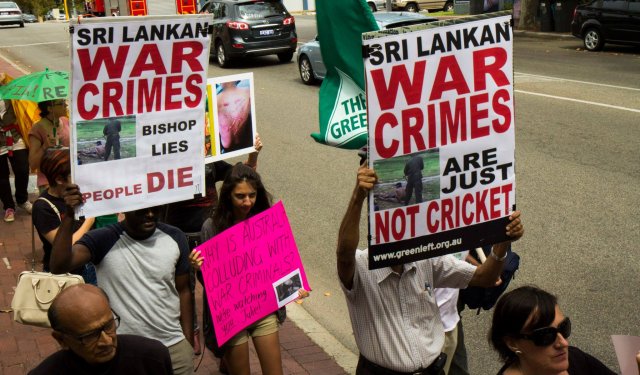
The United Nations Human Rights Council adopted a US-sponsored resolution on “Promoting reconciliation, accountability and human rights in Sri Lanka” on March 27.
But the resolution makes no mention of the plight of the Tamil people. The word “Tamil” does not appear once.
The resolution expresses “serious concern at the continuing reports of violations of human rights in Sri Lanka, including sexual and gender-based violence, enforced disappearances, extrajudicial killings, torture and violations of the rights to freedom of expression, association and peaceful assembly”.
It expresses alarm at the “significant surge in attacks against members of religious minority groups in Sri Lanka, including Hindus, Muslims and Christians”.
But the right of Tamils to national self-determination is implicitly rejected when the resolution reaffirms its “commitment to the sovereignty, independence, unity and territorial integrity of Sri Lanka”.
The resolution calls on the Sri Lankan government to “conduct an independent and credible investigation” into allegations of human rights violations. Since the government is the main perpetrator of human rights violations, this amounts to asking the government to investigate itself.
The resolution does, however, ask the Office of the High Commissioner for Human Rights to “monitor the human rights situation in Sri Lanka”.
It also asks the High Commissioner to “undertake a comprehensive investigation” of crimes committed by “both parties” during the final stages of Sri Lanka's decades-long civil war. The resolution does not say who “both parties” were.
In fact, the war, which lasted for nearly three decades, was a conflict between the Sri Lankan government and the Liberation Tigers of Tamil Eelam. The LTTE fought for an independent Tamil state, a goal which had strong support among Tamils as a result of systematic repression and discrimination against Tamils.
The government finally defeated the LTTE in 2009. Tens of thousands of Tamils were massacred in the final weeks of the war.
Many Tamils criticised the resolution as inadequate. A statement issued on behalf of the Tamil Civil Society Forum said: “We deeply regret that this resolution does not provide for the establishment of a robust mechanism of international investigations in the form of an International Commission of Inquiry.”
They noted that the High Commissioner for Human Rights was asked to “investigate” crimes committed during the war, but not those committed since the end of the war: “The resolution does not explicitly provide her office the authority to investigate ongoing violations.”
Gajendrakumar Ponnambalam, the president of the Tamil National Peoples Front (TNPF), said there is a need for “a credible international investigation and a judicial process through the ICC [International Criminal Court] or an ad hoc special tribunal”.
TNPF general secretary Selvarajah Kajendran criticised High Commissioner Navi Pillay’s talk of “reconciliation” in her report to the Human Rights Council.
Kajendran said: “The language of reconciliation for the Tamils sounds hegemonic. The only way in which normalcy can return to the lives of the Tamils is by recognising their right to self-determination and by establishing self-government wherein they can take control of their own affairs.”
The Sri Lankan government also criticised the resolution from the opposite direction. It claimed that the proposed “investigation” of past crimes by the High Commissioner for Human Rights was a threat to Sri Lanka’s sovereignty.
The resolution was adopted with 23 votes in favour, 12 against and 12 abstaining. Among those voting against were Russia, China, Cuba and Venezuela.
It is not surprising that Russia, which has violently repressed rebellions by ethnic minorities such as the Chechens, would oppose an “investigation” into war crimes committed in similar circumstances.
China’s vote was influenced by its economic interests in Sri Lanka. China has been given access to the port of Hambantota on the south coast of the island, which is very close to the trade routes linking China to the Middle East and Africa.
Cuba and Venezuela are very suspicious of any US talk about human rights. Explaining its vote against the US-sponsored resolution, Venezuela said that such “interventionist” resolutions were “most often used against developing countries”.
It is true that the imperialist powers often use “human rights” as an excuse for intervention in Third World countries. Cuba and Venezuela have been victims of this.
But in the case of Sri Lanka, the human rights violations are real, and have in fact been markedly downplayed in the US resolution. This is because the US has been complicit in the crimes of the Sri Lankan government.
The main form of imperialist intervention in Sri Lanka in recent years was the military aid given to the Sri Lankan government by the US and its allies, such as Israel and Britain. This aid played a crucial role in the government’s war against the LTTE, which was actually a war against the Tamil people.
The International Monetary Fund and World Bank have also intervened in Sri Lanka’s economy.
Compared with these forms of military and economic intervention, the toothless “investigation” by the High Commissioner for Human Rights is much less significant.
Tamils have the right to demand justice for the crimes committed against them during and after the war. But they are unlikely to get justice from institutions such as the United Nations, which are dominated by the imperialist powers. Still less are they likely to get national self-determination from such a source.
Only by collaboration with socialists, militant unionists and other progressive people in the predominantly Sinhalese south of Sri Lanka is there a chance for the Tamils to gain self-determination even if the prospect appears remote right now.
